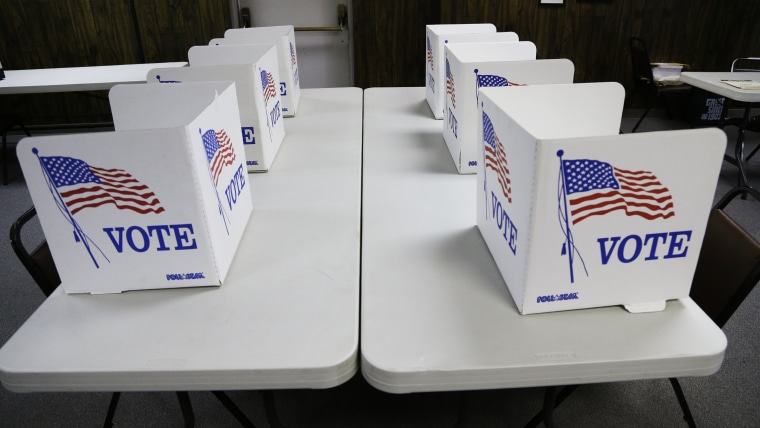Hillary Clinton laid out a bold, progressive vision on voting rights yesterday, endorsing both a 20-day early-voting window nationwide and a universal, automatic voter registration system. It was, in effect, the Democratic frontrunner throwing down the gauntlet, challenging her rivals in the other party. "What part of democracy are they afraid of?" she asked.
For voting-rights advocates, it was cause for celebration. But for the right, it's ... complicated.
The challenge for Clinton's Republican critics is finding something substantively wrong with her proposals, which isn't easy. We know from recent history that the GOP's coordinated assault on voting rights, and imposition of voter-suppression schemes unseen since the days of Jim Crow, has positioned the party firmly against voting rights. Indeed, the Republican-led Congress won't even consider repairs to the Voting Rights Act, gutted by their allies on the Supreme Court.
But GOP officials and presidential candidate can't come right out and say they're hostile to voting rights, and they certainly can't admit that they want to restrict Americans' access to their own democracy. So how in the world are they supposed to respond to Clinton's ambitious plan?
So far, it's a work in progress. The Republican National Committee, for example, called Clinton's remarks "misleading," though it has not yet pointed to anything from the Democrat's speech that's untrue. Wisconsin Gov. Scott Walker (R), whom Clinton called out by name, said her plan "defies logic" -- he didn't say why -- adding, "Clinton's extreme views are far outside the mainstream," as if most of the country is hostile to expanded voting rights.
And then there's New Jersey Gov. Chris Christie (R), also called out by name yesterday, who offered a rather knee-jerk reaction while campaigning in New Hampshire. The Bergen Record reported:
Governor Christie went on the attack against Hillary Clinton on Friday, saying the Democratic presidential candidate is calling for an expansion of voter registration because "she just wants an opportunity to commit greater acts of voter fraud." [...] "Secretary Clinton doesn't know the first thing about voting rights in New Jersey or in the other states that she attacked," Christie said. "My sense is that she just wants an opportunity to commit greater acts of voter fraud around the country."
Really? That's what Christie came up with?
Look, I don't really expect Republican presidential candidates to endorse Clinton's ideas or applaud her speeches. It's a campaign. They're supposed to draw distinctions and offer competing visions. I get it.
But to say that a universal, automatic voter registration system is intended to create voter fraud -- or worse, "greater" acts of fraud -- isn't just wrong, it's lazy.
As the scandal-plagued governor probably realizes, the voter-fraud scourge is largely a figment of far-right imaginations. But even putting that aside, automatically registering eligible Americans to vote when they turn 18 -- creating an opt-out system, instead of an opt-in system -- wouldn't affect the prevalence of non-existence fraud anyway.
I'm not sure what the best arguments are against Clinton's plans, but I do know Republicans will have to do better than this.
Update: Jon Chait notes today that "there are a number of ways one might make voting more convenient without enabling fraud." Among them: expanding early voting, making Election Day a national holiday, and implementing automatic voter registration. Clinton has endorsed all of these measures. Republicans oppose all of these measures.
On a related note, Brian Beutler has a terrific piece today, adding, "Clinton’s plan ... demands clarity from her opponents. She has proposed that every American, except those who opt out, be automatically registered to vote when they turn 18, and that every state offer at least 20 days' worth of early voting. Republicans can’t easily oppose this -- and oppose it they must -- without being explicit about the fact that they want to keep the voting rolls as trim as possible."
